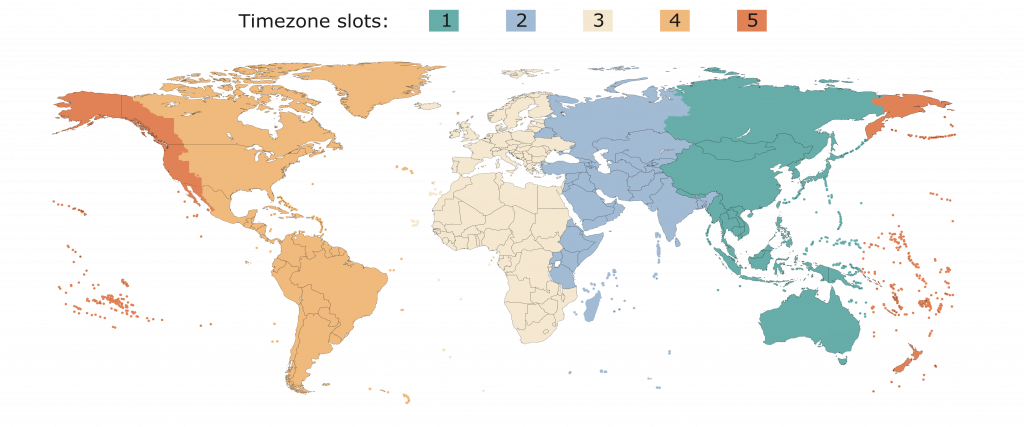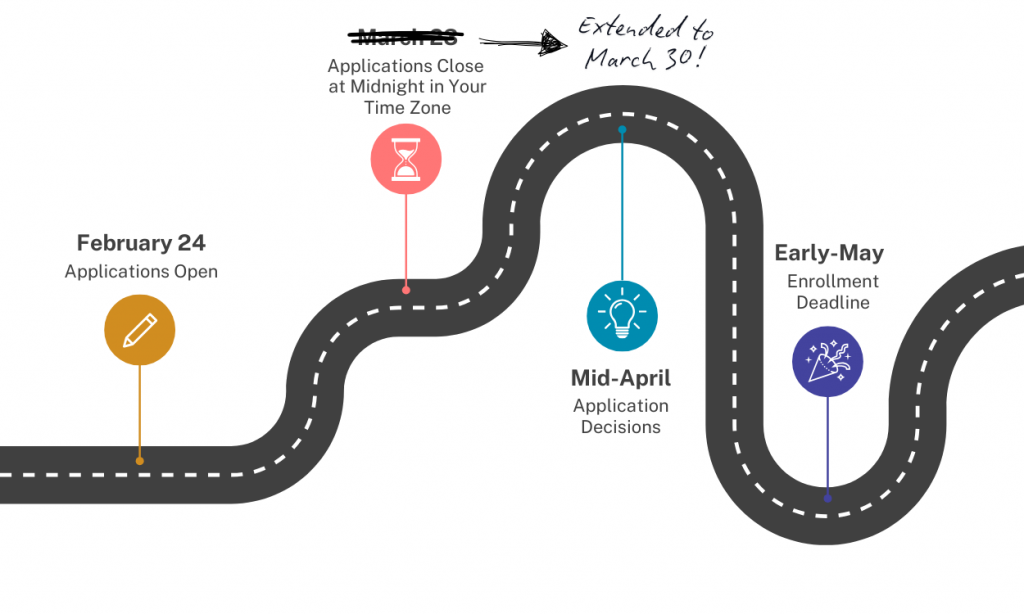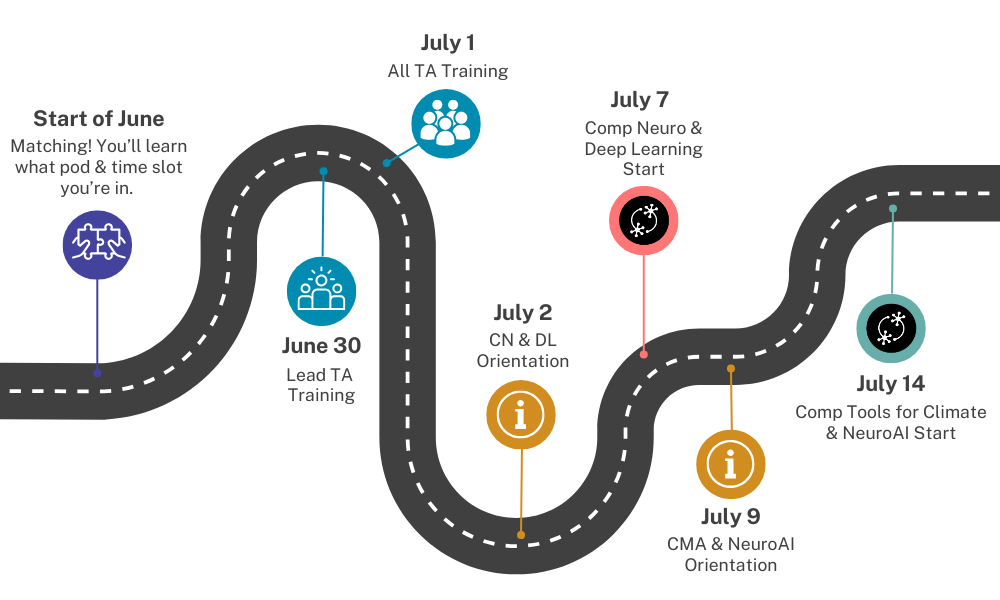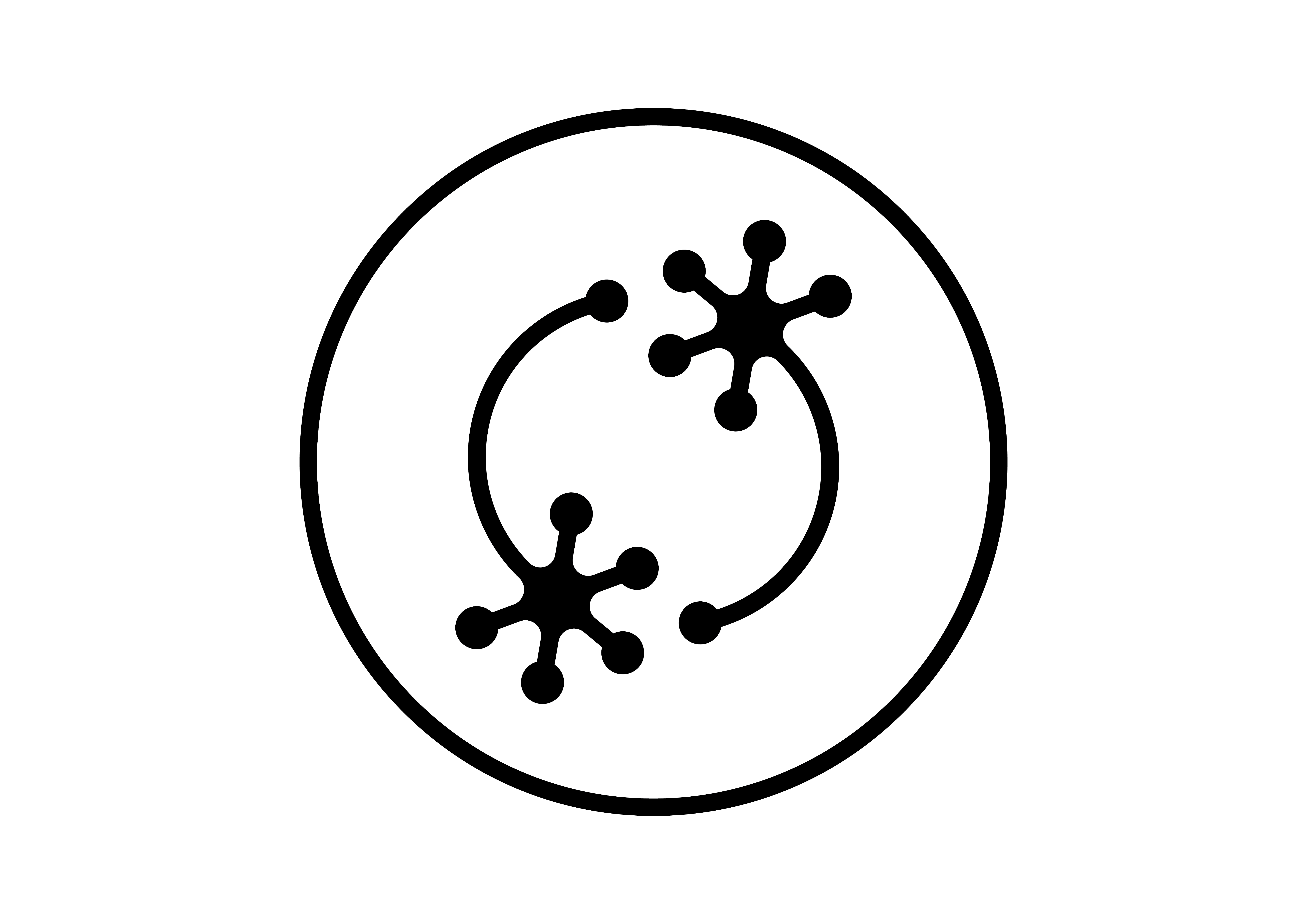Course Offerings
We offer courses that teach skills and techniques for computational sciences and research in Neuroscience, Climate Science, and Artificial Intelligence and Machine Learning.
Our courses are geared towards adult learners with undergraduate-level scientific or technical knowledge as a prerequisite.
Course applications are closed for 2025. Join our mailing list to be the first to hear about our 2026 courses.
How Does It Work?
Our courses are inclusive, intensive 2- or 3- week synchronous, virtual academies in which you are matched into a pod with ~15 other students.
The day is broken up into curriculum time and projects time. You are expected to be on Zoom and engaging with your pod during both curriculum and projects time. During curriculum time, your pod’s assigned teaching assistant will support you in going through our interactive course materials. After a midway break, you will work on your group research project. You will receive additional support from your pod’s teaching assistant, a project-specific teaching assistant who’s knowledgeable about your dataset, and a project mentor.
Course Benefits
Our courses place an emphasis on learning, collaboration, and applied knowledge through research experiences.
You’ll get to work closely with a group of peers with similar research interests, receive live mentorship and guidance, do a novel research project, and receive educational materials from amazing scientists around the world.
Our courses are intense and provide an introduction to many topics in the field with the opportunity to dive in deeper based on your interests.
Course Structure
Students work in small learning groups, or pods, made up of 10-15 students and a dedicated teaching assistant. These pods are formed on time slot, common research interests, and language preference using our custom matching algorithm.
Each day, students spend approximately 4.5 hours on curriculum and 3 hours on research projects.
Coursework
Composed of mini-modules, each with a short video introducing the concept, narrative explanation, and interactive coding tutorials in Python. All in an interactive Python notebook so that you can execute code in-line while you learn with your peers.
Your assigned teaching assistant is with your pod for all of curriculum time.
Research Projects
Apply the techniques you are learning to real research projects matching your interests. Your pod is split into two project groups. You then work with the support of your pod’s teaching assistant, a project teaching assistant, and a mentor to formulate research questions and explore available open science datasets.
Students can opt out of the project portion of the course if they are feeling overwhelmed. They will still receive the Course Certificate, but without the Projects badge.
All TAs and students who receive a Project badge will be englible to apply for the Impact Scholars Program after the course is over. This program allows teams to continue conducting academic research with the support of a mentor.
Timing
These intensive programs are offered in July to align with major summer breaks from most education programs. Courses will generally be full-time commitments for 2- or 3- weeks.
Courses are delivered in five timeslots around the world to align with global time zones. You can see our timezone widget here.
Students are not allowed to take the course overnight, so make sure to pick an appropriate daytime time slot when completing your application.

Slot 1:
Course Work: 00:30 – 05:00 UTC
Project Time: 06:00 – 09:00 UTC
Slot 2:
Course Work: 04:30 – 09:00 UTC
Project Time: 10:00 – 13:00 UTC
Slot 3:
Course Work: 08:00 – 12:30 UTC
Project Time: 13:30 – 16:30 UTC
Slot 4:
Course Work: 13:00 – 17:30 UTC
Project Time: 18:30 – 21:30 UTC
Slot 5:
Course Work: 17:00 – 21:30 UTC
Project Time: 22:30 – 01:30 UTC
Topics and Subjects
| Course Title | Course Description | Course Link | Next Course Dates |
| Computational Neuroscience | The curriculum integrates cutting-edge advances in machine learning and causality research with state-of-the-art modeling approaches in neuroscience. | See Course Details and Upcoming Dates | July 7-25, 2025 |
| Deep Learning | Our Deep Learning (DL) course grew out of the realization that there is a real need for teaching an ethically responsible hands-on TA-guided code-first DL curriculum that emphasizes how DL can be used to advance science and achieve better scientific insights. | See Course Details and Upcoming Dates | July 7-25, 2025 |
| Computational Tools for Climate Science | Through this program, students will gain skills and knowledge in the areas of climate science and impact, computational methods, data access, and scientific practices. | See Course Details and Upcoming Dates | July 14-25, 2025 |
| NeuroAI | What are common principles of natural and artificial intelligence? The core challenge of intelligence is generalization. Neuroscience, cognitive science, and AI are all questing for principles that help generalization. | See Course Details and Upcoming Dates | July 14-25, 2025 |
| Open Science 101 | Open Science 101 is a free, one-week, part-time course designed to introduce participants to the principles and practices of open science. This course is structured differently than our traditional full-time courses, view the course page for more information. | See Course Details and Upcoming Dates | No upcoming dates. Check back. |
How to Apply
Applications for 2025 are closed. You will need to create a profile in our Portal system and complete and application through that platform once they are open.
Students
- Courses require a full-time commitment:
- 8 hours of study per day, 5 days a week.
- No more than two absences to receive a certificate
- We do not allow students to take the course overnight
- Students are placed in pods with about 15 students and a teaching assistant and work collaboratively
- Generally expected to have video camera on and engage in classroom discussion
- Work on research projects with input from your pod’s teaching assistant, an additional project-specific teaching assistant, and a project mentor
- Each student will have a role in a collaborative team project that includes a presentation at the end
- Students can opt out of the project if they are feeling overwhelmed with the course content
- Students receive a certificate of completion at the end, if students also complete the project portion they will receive a project badge
- There are no certificates for completing the project only
- See full Course Attendance Policy
- All course materials are freely available online. Students are invited to review the materials before applying to ensure the course is a good fit for them
Teaching Assistants & Project Teaching Assistants
- Full-time, temporary paid positions as either a Teaching Assistant, Project Teaching Assistant, Lead Teaching Assistant, or Lead Project Teaching Assistant
- All roles facilitate problem-based learning for our students
- A certificate and TAs may request a teaching letter of support
- Teaching Assistant Role
- 4.5 hours per day in classwork with students
- 1.5 hours per day in project time with students
- 2 hours per day of teaching preparation and admin
- Project Assistant Role
- 8 hours per day in project time with multiple student classrooms
- Lead Teaching Assistant Role
- Leadership of other assistants, including managing absences and providing guidance and training
- Requires additional content knowledge and materials preparation
- Have previously been a TA
- Higher compensation for additional commitment
- Lead Project Teaching Assistant Role
- Plan and run weekly meetings for Project TAs to support each other and problem-solve
- Have previously been a project TA
- Higher compensation for additional commitment
Course Cost for Students
We adjust our course fees based on the cost of living of where the student is when they take the course.
Teaching Assistant Payment
We determine teaching assistant pay based on role and the cost of living of where the TA is during the course.
Timeline
All course communications happen through the email you registered for the Portal with. Make sure to check this email and that noreply@neuromatch.io is on your safe-sender list.
Application Dates:
- Applications Open
- February 24, 2025
- Applications Close
- March 30, 2025, midnight in your local time zone
- Application Decisions
- Decisions are out!
- Enrollment Deadline (including payment for students)
- Due May 13 @ Midnight UTC


After Enrollment:
- Matching Date (this is when you’ll know which timeslot you are in and information about your pod)
- Synchronous TA Training
- June 30 for all Lead TAs
- July 1 for all TAs
- Orientation (required for all students and TAs)
- CN & DL: July 2
- CMA & NeuroAI: July 9
- Courses Start!
What Past Participants Are Saying
Don’t just take it from us, hear from students and TAs who have taken our courses!
Frequently Asked Questions (FAQ)
What if I have to miss some days of the course?
The course design is cumulative, meaning that each day requires knowledge from the previous day. Thus, missing any days of the course makes it difficult to keep up. If you know you will miss some of the course, it would be best to apply next year instead. In case of emergencies, students can miss up to 2 days and still receive a certificate. All of the content is freely available online, so students missing just a few hours of the course may be able to catch up by viewing the lectures and lessons out of sync with their pod.
Review the full Course Attendance Policy.
I’m a student and cannot afford the course fee, what are my options?
In exceptional circumstances, individuals who cannot afford the reduced fee may apply for an additional hardship discount through the payment portal. This will take place after acceptance at the time of enrollment. All students will have to cover the processing fee, this fee is scaled to your local cost of living, just as the course fee is.
I withdrew my application in the Portal to make an edit, but now I cannot reapply!
Please email nma@neuromatch.io and ask us to delete that application. You’ll be able to resubmit your application!
Am I eligible to apply as a TA if I haven’t officially received my undergraduate degree but finished all necessary academic coursework?
Yes. We define an undergraduate degree as a ~4-year program where all academic requirements for graduation are completed. In some fields and/or regions—such as medicine or engineering—degrees may be conferred only after mandatory industry internships, national licensing exams, or additional basic training periods, which serve as professional rather than academic requirements in most cases. If you’ve finished your coursework but are awaiting such steps, you’re still eligible to apply as a TA.
I’m a TA and I’m confused about the acceptance and payment process.
We’ve created a guide that walks TAs through accepting their offer and the several tax and payment forms they need to fill out. See our Teaching Assistant Payment Instructions.
Do you offer refunds?
We hire and commit to paying teaching assistants based on the number of students signed up for each course and are therefore not able to grant refunds to any students after matching occurs, usually in early June. You can read more about our refund policy here. If you have an emergency situation that you feel grants you exemption from this policy, you may complete this form for consideration. Decisions about refunds are made on a case-by-case basis and can’t be guaranteed past the deadline above.
The nonrefundable processing fee portion is not refundable.
If I was accepted, but can not attend this year, can I defer my enrollment to next year?
No, you will need to reapply.
Can I apply as both a teaching assistant and a student?
Yes, you can submit applications for both roles, but you will only be accepted for one.
Are your courses graded?
No, students are not graded and we cannot supply grades.
Do these courses provide credits at my university?
That is up for your advisors at your university to determine. Many university graduate programs DO offer credit for these courses by demonstrating your certificate and showing the curriculum to them.
What types of payment are accepted?
Available payment options differ by country, but Debit Card, Credit Card and Direct Bank Transfer are available in nearly all countries. Additional options include Link, Google Pay, WeChat, Cash App Pay, Klarna. We do not accept purchase orders or invoices from universities due to the complexity of university invoicing, and the relatively small amount of money for these transactions.
What time zone will the course take place in?
We offer 5 time slots to accommodate participants globally. You can see which time slot is best for you here. After you’ve been matched to your pod, you’ll be able to see your pods time slot in the portal.
Will the courses be in any languages other than English?
The main language of instruction will be English, and all materials will be in English. In addition, many of our students will be grouped into pods where the TA and students all share another language. Language pods are subject to availability and cannot be guaranteed.
How do students get grouped into teams or ‘pods’?
We use an algorithm [1, 2, 3] to place people in complementary groups based on common interests, time availability, seniority, and in many cases shared language. This will allow students to meet online at a time and context that is most convenient for them.
Do I need a letter of reference to apply?
Nope!
Can Iranian residents participate in the courses?
Yes! Iranian residents can apply to be either a student or a TA. Since the founding of our courses in 2020, we have prioritized global inclusion and have received a sanctions exceptions for all our courses that allows us to run our course in Iran.
I have logged in to the Portal but cannot see the applications, what’s wrong?
You have to complete your Profile in the upper right before you begin. There is also an email verification that you need to complete before your account is active.
I am having trouble creating an application through the Portal from a mobile browser.
We have not been able to test our application on mobile browsers. Please try to use a computer with a normal display instead.
Do students and TA receive a certificate?
Yes, both students and TAs will receive a certificate of completion. Students must comply with our Attendance Policy. Certificates are in the Profile page of Portal, under Documents. Students and TAs must complete the end of course survey to access their certificate. If you choose to connect your Portal account to your ORCiD account, you can publish your certificate via ORCiD.
Have more questions? Email us at nma@neuromatch.io







